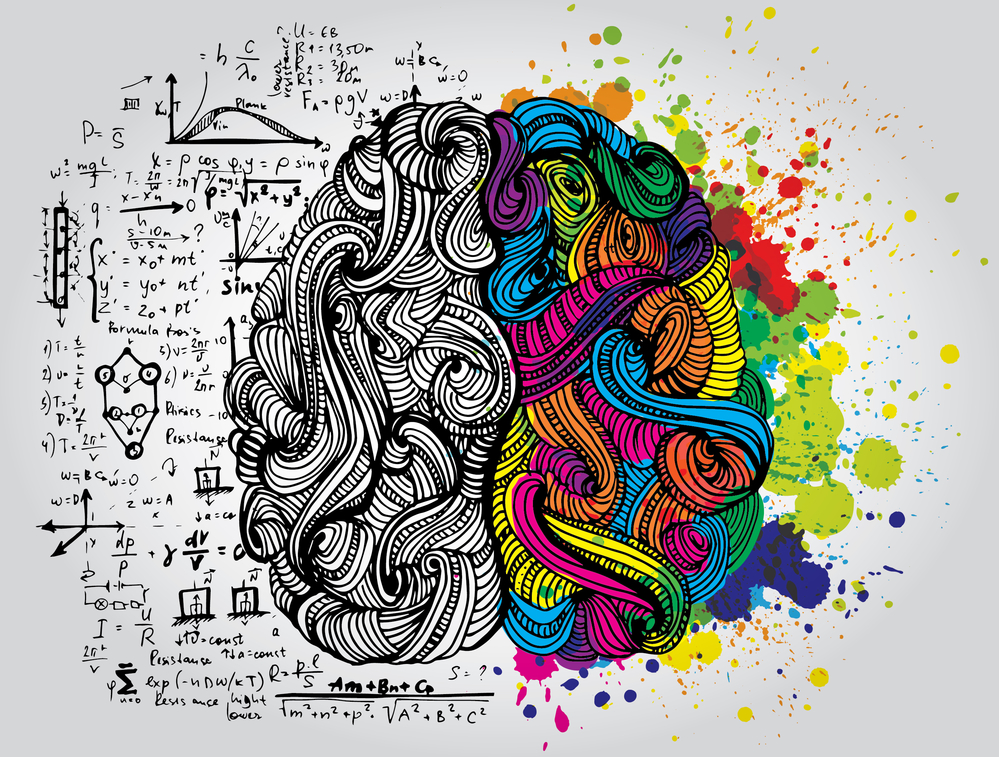My parents dragged me to a fancy dinner party in 1999. I was 13-years-old: at the end of the night, the adults ask to see a magic trick. I grab a dinner roll and a napkin from the table, cover the roll with the napkin, pretend to concentrate really hard, and, low and behold – the roll floats! Though the illusion is convincing, the method is silly, and I worry that I’m going to be found out.
Fortunately, my parent’s friends look at me uneasily and ask, “How did you do that?” Of course, I don’t tell them. Instead, I just smirk and think, “Wow. It is shockingly easy to deceive people.”
***
The first lesson most magicians learn is that the mind is filled with glitches. If you understand the glitches, you can exploit them to create magic. To illustrate this I’ll break the magician’s code and show you how I made that roll float nearly 20 years ago.
Here’s what the audience sees:

Here’s what’s really going on:

The roll is literally being held up by a damn fork. That’s it. I know, the explanation is incredibly underwhelming. Honestly, all magic tricks are underwhelming behind the scenes. But if you saw the floating roll spontaneously at a dinner party after a few drinks, you would be enchanted. The mind just isn’t setup to deconstruct illusions. Instead it defaults to frustration, acceptance, awe, or curiosity.
I’ve been a student of the mind my entire life. In fact, it’s one of the reasons I love therapy and meditation; they both shine a bright light in the dark corners of our inner world.
In this article, we’re going to discuss three of the most prominent shortcomings of the human mind and how they affect us. I know it sounds weird to claim that otherwise unique minds have similar glitches, but you won’t have to take my word for any of this. I’ll give you exercises that make them obvious to you. We’ll also discuss how to address these glitches and in doing so, improve your life.
The negativity bias: how it destroys your self-esteem, understanding of the world, and everything in between

What is the negativity bias and why do we have it? The negativity bias is your mind’s tendency to give more attention to a negative stimuli than a positive one. This used to help keep us alive. Imagine that you’re a hunter-gatherer and two things happen simultaneously:
1) A wild boar runs in front of you
2) A venomous snake starts approaching you
If you focus on the boar – which could feed your tribe for weeks – you leave yourself vulnerable to the snake. So, eventually all of the people who naturally focused on the positive – the boar – fell victim to the negative – the snake – and died out. Over time we evolved to pay more attention to the things that threaten us than the things that delight us.
Noticing the negativity bias and how it’s affecting you: a simple thought experiment will help you see the negativity bias in your life. Imagine that you have a performance review with your boss. She gives you two pieces of feedback. The first was she loved your most recent project. She raves about how great you are as a leader and how your work helps the company grow. The second is that she hates how you act in meetings. She criticizes you for making tone-deaf remarks, looking slovenly and wasting company time. She gives both pieces of feedback with equal amounts of energy, detail, and attention.
How would you feel walking out of that performance review? In theory, you should feel neutral. The good and the bad should cancel themselves out. But you wouldn’t feel neutral. Instead, you’d feel horrible, because your mind blows the existential threat (your boss’ criticism) out of proportion. In fact, most of us are so dominated by the negativity bias that we could receive two compliments and one criticism and be moved only by the criticism.
Of course, this doesn’t just happen in performance reviews – it happens all the damn time. It’s why sleights feel worse than compliments feel good. It’s why you replay every crappy thing you said and forget about the wit or insight you offered. And if you have any sort of trauma around attachment, safety or abandonment (and who doesn’t these days?), the negativity bias is going to make the world – both inner and outer – seem more dangerous and volatile than it actually is.
To further complicate the matter the media hijacks the negativity bias to captivate us by covering stories that are negative, frightening and anxiety provoking. This makes all of us worse for the wear and paints a very distorted picture of reality. The end result is that almost all of us feel worse about ourselves and the world than we really should.
Overcoming the negativity bias: overcoming the negativity bias is easier said than done. Here are a few approaches:
- Be aware of your mind’s tendency to focus on the negative at the expense of the positive. For some people, a simple awareness of the bias can fix the problem. If awareness alone doesn’t work, when you notice yourself going negative, try shifting your focus to notice the good in yourself or the situation. Note: See the final section of this article for more thoughts on this form of self-control.
- Reduce the amount of time you spend with the people, activities, and media that exploit the negativity bias, especially inflammatory news sources. Doing so may make it easier for your mind to find balance.
- Start a gratitude practice. Consider writing down a few things you’re grateful for each morning, and a few things that went well each evening. This will help train your attention on what’s going well in your life. One of my friends says that he feels like this practice has rewired his mind. There’s a gratitude journal that I love, The Five Minute Journal, which helps you develop this exact habit.
- Keep a list of your achievements and compliments. Review the list from time to time, especially when you’re feeling down on yourself. Doing so will help counter balance your mind’s tendency to shit on you.
An important note: the negativity bias is the mother of all mental flaws, at least when it comes to self-esteem and clarity of vision. As you read about the other glitches, keep the negativity bias in mind because none of them would be as detrimental without it.
Your mind routinely hijacks itself and creates needless emotional instability

What is mental hijacking and why do we do it? Have you ever noticed that your body and mind are almost never in the same place at the same time. We move through the world in daydreams, losing ourselves in thought, fantasy, and worry.
The problem is that happiness, connection, and contentment can only be found in the moment, so our tendency to lose ourselves is deceptively destructive. I know that sounds like an absurd claim, but I’ll help you see it in yourself in just a sec.
There are a lot of theories about why our minds are so reluctant to rest in the present. The one that I find most compelling is that being a little bit unhappy (a common side effect of being lost in thought) serves the species. If a lot of people are unhappy, they are likely to begin striving for a better reality, which breeds innovation and development. Another more obvious theory is that if we spend our time lost in thought, we’re likely to worry about the future which will help us pre-empt existential threats. But again, the problem is that worrying primarily leads to anxiety and unhappiness.
Noticing the mental hijacking and how it’s affecting you: like many things related to understanding our minds, pointing out its tendency to be lost in thought is tricky. In hopes of succeeding, I’ll give you three different ways to notice what’s going on:
1) After you’re done reading this sentence, close your eyes, breathe in and out through your nose, and try to count the next 20 breathes without mental interruption.
How’d it go for you? If you’re like most people, you failed. Your mind quickly lost track of the present moment and started thinking about something else. That shift from present focus to mental wandering? That’s the mind hijacking itself. When that happened you became suspended in a daydream.
Again, noticing this – or even just believing it – is deceptively difficult, because almost all of us spend our lives in daydreams, even though we don’t realize it.
2) When you’re done reading this paragraph I want you to pause for a few moments to take in your environment. Notice the sensation in your toes, how vivid the color and motion around you is, the sensations running through your body, the sounds coming from outside, and the feel of the air against your skin.
Doing this should have made you feel like life just clicked into HD. The question is, why do we have to pay special attention to reality to notice it? The best-case scenario is that you are deeply focused on whatever you’re paying attention to and lose the resof of the world along the way. A more common scenario is that your mind is scattered and drifting away from the moment, which tends to lead to needless anxiety, discontent, and unhappiness.
3) When you’re done reading this paragraph, I want you to close your eyes and recall a time when you were truly happy. This could be a great night out with friends, the last time you got laid, a transcendent chocolate cake, playing with your pet, standing atop a tall mountain or anything else. When recalling that moment really let the details sink in. Remember the sights, smells, sounds, images, and feelings.
Once you’ve opened your eyes, check in with yourself. Are you a bit happier now than you were before you began the exercise? Again, this is an instance of your thoughts hijacking you and distorting the present moment. Many people identify with their thoughts so powerfully, that their thoughts have deep sway over their feelings. If you’ve ever spent time mentally reviewing an argument only to find yourself getting heated just thinking about it, then you know exactly what I’m talking about.
The more you become aware of your thoughts the more you’ll realize that much of life is lived in a daydream (or, in many cases, a low-grade waking nightmare).
Overcoming the mind’s tendency to hijack itself: again, overcoming this particular glitch is easier said than done (a familiar refrain at this point, I know). You basically have to use your mind to defeat it’s own natural tendencies. Here are a few methods that tend to work, though they are best thought of as practices:
- A daily meditation practice is the gold standard for breaking the trance of waking life. Developing the practice can be difficult, but many people find the investment to be worth it. More on meditation here.
- Minimize your engagement with the things that act like mental napalm, especially your phone, computer, or tablet
- Take a moment to really connect with your body and surroundings. Do this several times a day for a few seconds. Personally, I like to focus on the sensations in my toes and fingers, as well as the colors in the room around me. Doing this will draw you out of your thoughts and into the moment.
- As you become more adept at drawing yourself into the moment, you’ll notice yourself spontaneously clicking in and out of trance. When this happens make a mental note of it. You can simply say to yourself, “Present.” The more you note the transition between fantasy and reality, the easier it will be to exist in the present.
The unconscious filters in your brain are actively distorting reality

A note about the difference between your mind and the brain: your brain is the mushy physical instrument in your head firing with electricity and running most of the show. Your mind, which most theorists believe arises from your brain, is the invisible part of you that is aware and accounts for your experiences, thoughts, emotions, beliefs, attitudes, etc.
What are unconscious filters and why do we have them? Our minds can only process a limited number of stimuli at any given time. Depending how you’re wired, the number is somewhere between 3-9 items. That means that virtually everything in the world is being filtered out of your mind in any given moment.
In fact, a lot of magic tricks leverage this exact glitch. If you’re following my hands with your eyes, trying to process the story I’m telling you, actively searching for any misdirection or secret moves while trying to pick a card, I can literally do things in front of your face without you noticing. I know that sounds insane. Again, don’t take my word for it, check out my favorite TED talk ever, “The Art of Misdirection” by Apollo Robbins.
To the best of my understanding, the reason we filter out most of the world is because our brain’s have a limited capacity to support our conscious minds. The brain just seems to have a bottleneck in its ability to consciously track stimulation beyond just a few objects. After you hit that bottleneck, everything else becomes unconscious.
Noticing unconscious filtering and how it’s affecting you: though I could try to point out unconscious filtering in writing, I’ll never be able to do it as well as the video below does. By the way, even if you think you know how the game in the video works, it’s still worth watching as a quick refresher.
Unconscious filtering is likely inescapable. It’s worth discussing though, because of our friend the negativity bias. When you combine unconscious filtering with the negativity bias you start to see yourself, and our world, as being much worse than it actually is. This results, again, in a diminished sense of self, a world that appears more dangerous than it is, and the illusion of flimsy connections to the people you love.
Overcoming the unconscious filtering: since we probably can’t overcome unconscious filtering, we want to focus on overcoming the negative aspects of it. This requires combining the strategies for overcoming the negativity bias and mental hijacking.
First, it’s important to become aware of your own attention. This is a skill that takes a bit of time, but things like meditation, focusing on the sensations in your body, journaling, and eliminating things that fracture your attention will speed up your success.
Second, since you can only focus on a limited number of items, it’s important to tip the scales in your favor. Learning to pay attention to things like compliments, your strengths, gratitude, empowerment, connection, beauty, and optimism will make a very real difference in your life.
By doing these two things, you’ll foster an inner environment that is more capable, empowered, happy, and effective. Think of it as an operating system upgrade.
A closing note on psychology, healing, and the overstated power of thoughts

There’s a stupid belief in the world of psychology (and especially pop psychology) that seems to be taking hold. Specifically, it’s the belief that you can use your thoughts to change your thoughts, and in doing so, improve your life.
It tends to work like this: want to ask the attractive stranger at the coffee shop on a date, but afraid they’ll reject you? Well, reframe your thinking, son! Maybe you’ll fall madly in love, have wild sex and spontaneously buy a winning lottery ticket together. When you think about it that way, you’d be crazy not to go up and say hi.
While reframing your thoughts has the power to be motivating – and at times, soothing – it fails to address the underlying issue sabotaging you in the first place. In the example above, the issue would likely be social anxiety, a failure to understand social norms, or both.
A far better approach is healing the emotional wounds that inspire unhealthy levels of fear, anxiety, depression, disconnect, darkness, etc. As far as I can tell, this level of healing can’t be done with thoughts alone.1
I mention this because I don’t want you to believe that simply understanding your thoughts – or even fostering awareness about how your mind works – is a reasonable replacement for therapy and healing. It’s not. If you’ve been struggling with life for more than a month or so (and lord knows I’ve been there), then consider getting real help. On it’s own, no amount of reading, theorizing, or understanding, will heal your deep wounds.